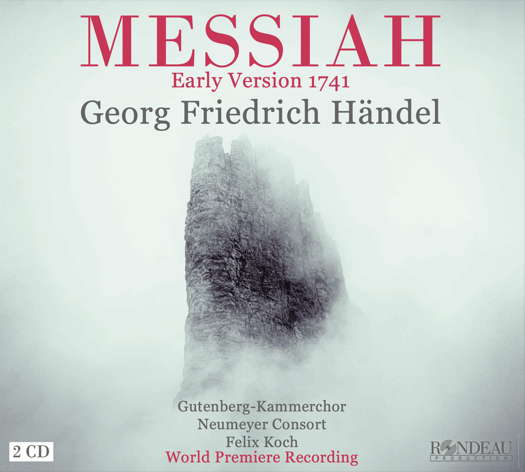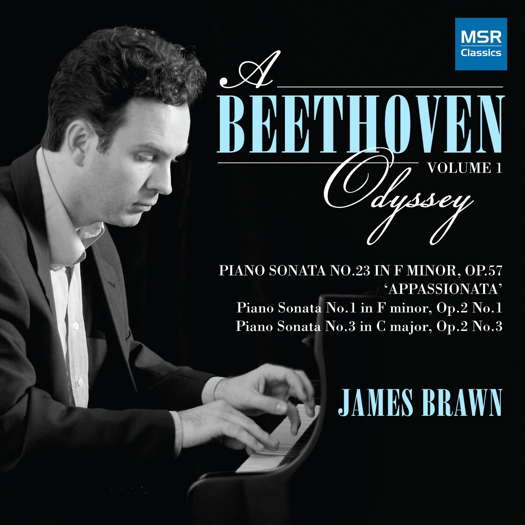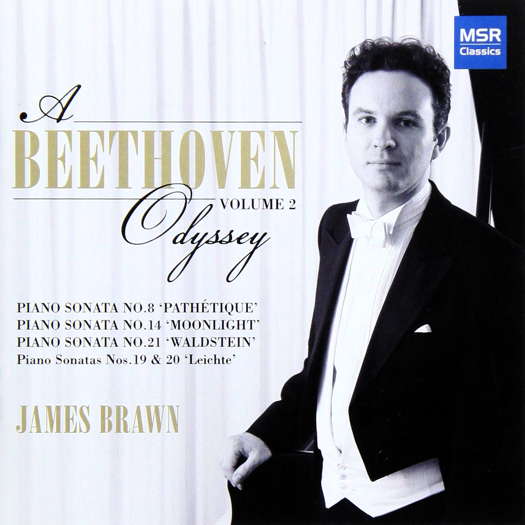- Melba Recordings
- Nicolae Herlea
- H Owen Reed
- Rodion Schtschedrin
- Mercadante
- Gregorian chant
- The Met
- Matthew Best: Alice

Very Interesting Listening
GERALD FENECH recommends a recording of the 1741 version of Handel's 'Messiah'
'Soloists and chorus sing with a lyrical intensity that is impeccable throughout and Felix Koch keeps a tight rein on proceedings ...'
The love affair that British classical music audiences have with the oratorio The Messiah is almost, one could say, disproportionate. But this is no shame. Since its Dublin premiere in 1742, the piece has been performed by choirs across the land every year since at least 1745. Georg Friedrich Händel (1685-1759) composed his most famous piece in 1741, and continued to work on it after its initial performance, finally arriving at the version we know today in 1754.
Impressive solo arias, like 'Ev'ry valley shall be exalted' and 'Rejoice greatly, O daughter of Zion' are interspersed with compelling chorus numbers, telling the story of Jesus' birth, life, death, resurrection and final victory over sin and death.
Listen — Handel: Ev'ry valley shall be exalted (Messiah 1741 Version)
(ROP622324 CD1 track 3, 0:22-1:02) ℗ 2023 Rondeau Production GmbH :
During Victorian times, there was a phase when The Messiah was performed by ever expanding musical forces - there almost seemed to be a competition to see just how big a chorus and orchestra could be crammed on to one stage before they fell through. Earlier, Mozart even got in on the act with his own arrangement of the work which was not, it has to be said, to everyone's taste. The rousing 'Hallelujah' Chorus is one of the most famous pieces of Baroque choral music, and by far the most widely-known section of the oratorio. Audiences tend to stand during performances - a tradition that allegedly began when King George II stood up during the chorus at the oratorio's debut London performance.
Listen — Handel: Hallelujah (Messiah 1741 Version)
(ROP622324 CD2 track 17, 0:00-0:47) ℗ 2023 Rondeau Production GmbH :
The forgotten man behind the success of The Messiah is the librettist Charles Jennens, who adapted the words of the King James Bible, which Handel set to music. The composer's approach to setting the text is, at times, amusing - in the chorus 'All we like sheep have gone astray' the mood changes in the middle of the sentence, resulting in a rousing choir declaring their fondness for the woolly animal. Joking aside, Handel's ability to capture the mood - from passionate rage to serene pastoral moments - is what makes this oratorio one of the most enduring choral works of all time.
Listen — Handel: All we like sheep (Messiah 1741 Version)
(ROP622324 CD1 track 24, 0:00-0:48) ℗ 2023 Rondeau Production GmbH :
As already stated, Messiah was composed in 1741 and premiered in 1742 in Dublin on 13 April but, unfortunately, despite a myriad of recordings, the 1741 original remained on the shelf. Now, all of a sudden, this novel recording comes along, giving us the opportunity to assess for the first time what Handel's original thoughts were. Bringing the original version to life was no mean task because it is difficult to reconstruct an original version of the work, since Handel himself performed it with very different instrumentations.
The musicologist Malcolm Bruno was not happy with this and, based on the autograph score from 1741, created a version that corresponds to Handel's intentions when composing. Although not many, there are differences in some of the arias and in the instrumentation, but by far and large, this premiere recording of the original score makes very interesting listening, and there is solid quality all round, particularly from the Neumeyer Consort, who play with a warm and rich sound.
Listen — Handel: Sinfony (Messiah 1741 Version)
(ROP622324 CD1 track 1, 1:03-1:50) ℗ 2023 Rondeau Production GmbH :
Soloists and chorus sing with a lyrical intensity that is impeccable throughout and Felix Koch keeps a tight rein on proceedings, while letting all the dramatic elements of the work take centre stage.
Listen — Handel: O Thou that Tellest Good Tidings (Messiah 1741 Version)
(ROP622324 CD1 track 9, 3:12-4:12) ℗ 2023 Rondeau Production GmbH :
For Handel admirers, this issue is a must, but those whose tastes are more varied will surely not regret adding this Messiah version to their collection. Sound and presentation are first-rate.
Copyright © 25 December 2023
Gerald Fenech,
Gzira, Malta





